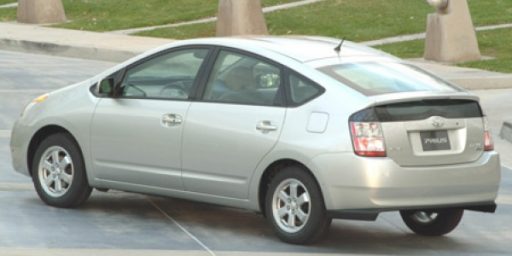Toyota Cars Safe: Government Study
The Obama administration's investigation into Toyota safety problems has found no electronic flaws to account for reports of sudden, unintentional acceleration and other safety problems.
The Transportation Department has released a study showing that Toyota does not have serious electronic flaws that make their cars unsafe.
The Obama administration’s investigation into Toyota safety problems has found no electronic flaws to account for reports of sudden, unintentional acceleration and other safety problems. Government investigators said Tuesday the only known cause of the problems are mechanical defects that have been addressed by previous recalls.
The Transportation Department, which was assisted by engineers with NASA, said its 10-month study of Toyota vehicles concluded there was no electronic cause of unintended high-speed acceleration in Toyotas. The study, which was launched at the request of Congress, responded to consumer complaints that flawed electronics could be the culprit behind Toyota’s spate of recalls.
“We enlisted the best and brightest engineers to study Toyota’s electronics systems and the verdict is in. There is no electronic-based cause for unintended acceleration in Toyotas,” Transportation Secretary Ray LaHood said in a statement.
Toyota has recalled more than 12 million vehicles globally since fall 2009 to address sticking accelerator pedals, gas pedals that became trapped in floor mats, and other safety issues. The recalls have posed a major challenge for the world’s No. 1 automaker, which has scrambled to protect its reputation for safety and reliability.
Toyota paid the U.S. government a record $48.8 million in fines for its handling of three recalls. The company has said it has not found any flaws in its electronic throttle control systems and said the previously announced recalls have addressed the safety concerns.
[…]
Despite its findings, LaHood said the National Highway Traffic Safety Administration was considering new regulations to improve safety. They include requiring brake override systems on all vehicles, standardizing keyless ignition systems and requiring event data recorders, or vehicle black boxes, on all new vehicles.
Transportation officials said they would also consider conducting more research on electronic control systems and review the placement and design of accelerator and brake pedals.
So, just because we’ve spent 10 months and who knows how many millions of dollars finding that there is no problem, we’ll nonetheless implement expensive solutions!
Indeed, while there were some 3000 incidents reported to the NHTSA, only five of them were able to be confirmed. Quite likely, the remainder were simple driver error and the reports were spurred by the publicity surrounding the alleged incidents.
Meanwhile, where does Toyota go to get its reputation back?







Toyota lost more than it’s reputation. It’s amazing we didn’t learn from the Audi experience years earlier. Lazy journalists and greedy lawyers make the world go round.
Oh man, and I’ve been so enjoying everyone getting out of the way of a Blue Prius.
Toyota lost more than it’s reputation. It’s amazing we didn’t learn from the Audi experience years earlier. Lazy journalists and greedy lawyers make the world go round.
Yes on every count. And I basically said the same when this story broke.